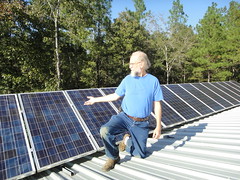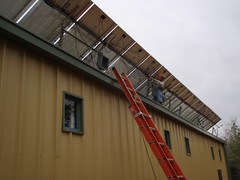Why is anyone still building fossil fuel (or nuclear for that matter)
power plants when solar is within a few years of being cheaper?
In other words, by the time those other plants can be built,
solar is very likely to be more cost-effective?
Marcia Goodrich wrote for physorg yesterday,
Affordable solar: It’s closer than you think,
 It’s a matter of economics. A new analysis by
[Michigan Technical University Associate Professor Joshua]
Pearce and his colleagues
at Queen’s University in Kingston, Ontario, shows that solar photovoltaic
systems are very close to achieving the tipping point: they can make
electricity that’s as cheap—sometimes cheaper—as what consumers pay
their utilities.
It’s a matter of economics. A new analysis by
[Michigan Technical University Associate Professor Joshua]
Pearce and his colleagues
at Queen’s University in Kingston, Ontario, shows that solar photovoltaic
systems are very close to achieving the tipping point: they can make
electricity that’s as cheap—sometimes cheaper—as what consumers pay
their utilities.
Here’s why. First, the price of solar panels has plummeted. “Since 2009,
the cost has dropped 70 percent,” says Pearce. But more than that, the
assumptions used in previous studies have not given solar an even break.
“Historically, when comparing the economics of solar and conventional
energy, people have been very conservative,” says Pearce.
It’s not just that the cost of equipment keeps dropping;
older panels remain more efficient than most previous estimates:
For example, most analyses assume that the productivity of solar panels
will drop at an annual rate of 1 percent or more, a huge overestimation,
according to Pearce. “If you buy a top-of-the-line solar panel, it’s
much less, between 0.1 and 0.2 percent.”
There’s more in the news article, and in
the journal article it references,
A review of solar photovoltaic levelized cost of electricity,
K. Brankera, M.J.M. Pathaka, J.M. Pearce,
Renewable and Sustainable Energy Reviews, Volume 15, Issue 9, pages
4470-4482. doi:10.1016/j.rser.2011.07.104
-jsq
MidAmerican Energy Holdings Co., ending the solar-panel maker’s search for a buyer.












